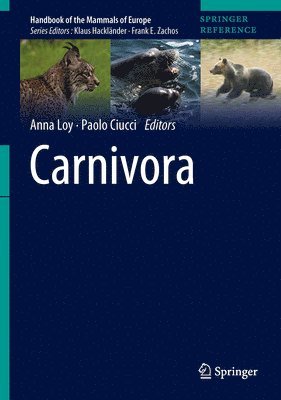
- Format
- Inbunden (Hardback)
- Språk
- Engelska
- Serie
- Handbook of the Mammals of Europe
- Antal sidor
- 850
- Utgivningsdatum
- 2025-12-16
- Förlag
- Springer Nature Switzerland AG
- ISBN
- 9783030440343
Carnivora
Fler böcker av författarna
-
Advances in Morphometrics
North Atlantic Treaty Organization, Nato Advanced Study Institute On Advance, Leslie F Marcus, Marco Corti, Anna Loy
This volume is based on the NATO Advanced Study Institute, "Advances in Mor phometries" held in 11 Ciocco, Tuscany, Italy from July 18-30, 1993, and directed by Leslie F. Marcus. The "Advances in Morphometries" ASI was advertised in Nature and a n...
Övrig information
Anna Loy is Full Professor of Zoology at the University of Molise, Italy. She earned her PhD in Evolutionary Biology from Sapienza University of Rome. For nearly a decade, her research focused on the evolutionary biology and ecology of moles. Over the past 20 years, she has expanded her interests to the monitoring, management, and conservation of endangered Italian mammals, with a particular emphasis on otters. Her research employs diverse methodologies, including radio tracking, species distribution, connectivity and niche modelling, 2D and 3D geometric morphometrics, non-invasive genetic sampling, and, more recently, environmental DNA freshwater monitoring.¿ In 2019, she was appointed Co-Chair of the IUCN SSC Otter Specialist Group. She is also a member of the Advisory Board of the National Park of Abruzzo, Lazio, and Molise and previously served on the national CITES Commission for the Italian Ministry of the Environment. As President of the Italian Mammal Society (Associazione Teriologica Italiana) from 2016 to 2020, she initiated and edited the first Atlas of Mammals in Italy.¿ She has served as Editor-in-Chief of the Journal of Zoological and Botanical Gardens, Assistant Editor of the European Journal of Zoology, and Editorial Board member of Aquatic Conservation: Marine and Freshwater Ecosystems. Prof. Loy has authored approximately 100 peer-reviewed articles and 30 book chapters. She also co-edited the NATO ASI volume Advances in Morphometrics.¿ Paolo Ciucci is Associate Professor at the University of Rome La Sapienza, where he teaches courses in Zoology, Wildlife Ecology, and Conservation. He earned a Master's degree in Wildlife Management and Conservation from the University of Minnesota in 1990 and a PhD in Animal Biology from the University of Rome La Sapienza in 1994. His primary research interests encompass wildlife ecology and conservation, including population assessment and monitoring, space-use patterns, movement ecology, feeding ecology, habitat selection and suitability, landscape connectivity, conservation planning, and human-wildlife conflict. More recently, he has explored the applications of genetic and genomic techniques in conservation. Prof. Ciucci has focused extensively on the ecology of large carnivores, particularly wolves and bears inhabiting human-modified landscapes. He has been principal investigator and coordinator in several field projects both in Italy and internationally. From 2014 to 2020, he served as Chair of the Research and Conservation Grant Committee of the International Association for Bear Research and Management and is currently an Editorial Board member of Hystrix, The Italian Journal of Mammalogy, and Ursus.
Du kanske gillar
-
Nexus
Yuval Noah Harari
Häftad -
Orbital
Samantha Harvey
Häftad
